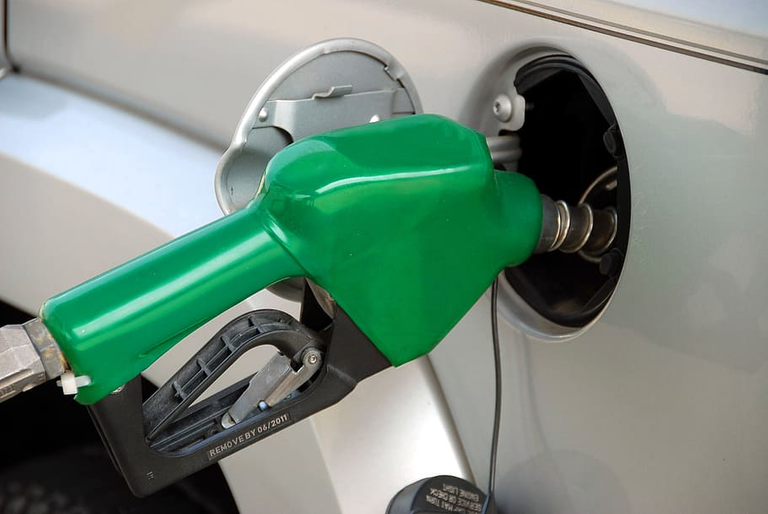Petrol Subsidy Showdown: Nigeria's Carbon Dance and Climate Quest
Get ready for a tale of commotion and change as we dive into the uproar over cutting petrol subsidies! The aftermath of this move is like a lingering echo, sticking in the minds and words of Nigerians and their nearby buddies. Picture this: it's like a campfire story that just won't fade away. But how long will this story captivate us? Well, that depends on the gasoline price roller coaster. Will it tumble down like a rollercoaster drop, or will it keep soaring like a rocket launch? Currently, it's an average of $0.6 a liter. A significant increase from an average of roughly $0.2.

Now, imagine me, a car owner cruising through the Nigerian landscape, having to pull a hat trick of adaptations to this new world order. Places I'd usually zoom to, I'm now on a journey of hiking trails or hopping on public rides. To put this in simple math, the speedometer's needle has almost split in half. And I'm not the only one embracing this automotive acrobatics.
It's like a massive choreographed dance – nearly everyone around me is joining the adjustment tango, choreographing their moves to reduce their car time and save those precious petrol coins. While this sounds like tightening belts, it's also like music to the ears of climate change folks, scientists, and researchers. What seems like a puzzle to regular folks is like a treasure map for the climate change explorers.
In simpler words, the fewer cars prowling the streets, which seems to be a trend from north to south, will work magic on the nation's carbon footprint. And that's not all, folks! Picture this: Nigeria's power scene is like a wild west showdown, with generators relying on petrol for their bullets. So, it's not just about driving slower; we're also choreographing the generator's rhythm to a new tempo.
No surprises here – when the Nigerian National Petroleum Corporation announced that petrol-guzzling had almost halved across the country, it was like a thunderclap in a clear sky. Roll the drums: 2023 stats from Statista unveiled Nigeria as the fourth-biggest carbon spewer (carbon dioxide, to be exact) in Africa's lineup, playing in the same league as South Africa, Egypt, and Algeria. This show was fueled by the 2022 data jackpot.
Now, let's hop into the time machine and zoom to the future: the petrol cutdown saga, orchestrated by the subsidy's dramatic exit, promises a thrilling sequel in the 2023 carbon emission data. But wait, there's more to this narrative! Consider this: Nigeria's subsidized petrol, once as elusive as a sneaky cat, found its way across borders to neighboring lands like Benin and Côte d'Ivoire. And now, with subsidies vanishing into thin air, not only is Nigeria's carbon footprint shrinking, but so is the footprint of the neighbors who relied on Nigerian petrol like a lifeline.
Even in the days of subsidy showers and cheap petrol rain, Nigeria's carbon emissions stood like a modest lamp in a grand mansion of light. Here's a mental image: Africa's carbon footprints, much like shoes on a shelf, have Nigeria and its pals fitting into the "small size" section, while countries like the UK, the US, and China are flaunting some pretty big numbers. Travel back to 2016, and you'll find that Nigeria's carbon contribution to the global dance floor was a mere 0.23%. Meanwhile, China hogged the limelight with 29.18%, the US joined in with 14.02%, and even the UK, a few steps behind, waltzed in with a not-so-small 1.03%.
Now, with the subsidy ship sailing off into the sunset, Nigeria's spot on the carbon stage is like a shooting star's path, blazing across the sky and settling into a new constellation. But hold on – this doesn't mean Nigeria will be immune to climate change's crescendo. Remember, the climate's rhythm plays across borders like a catchy tune on the radio. If there's a worldwide fund aimed at curbing climate change's mischief, Nigeria and its African companions should be the guests of honor at the fund's grand banquet.
As the curtain falls on this narrative journey, let your thoughts run wild like a herd of horses on a vast plain. What are your thoughts on all of this?
Resources
- https://www.worldometers.info/co2-emissions/co2-emissions-by-country/
- https://businessday.ng/news/article/nigerias-fuel-consumption-drops-28-post-deregulation/
- https://leadership.ng/nigerian-roads-freer-as-fuel-consumption-drops-drastically/
- https://www.statista.com/statistics/1268395/production-based-co2-emissions-in-africa-by-country/
- https://www.conservation.org/stories/what-is-a-carbon-footprint
Thanks for your contribution to the STEMsocial community. Feel free to join us on discord to get to know the rest of us!
Please consider delegating to the @stemsocial account (85% of the curation rewards are returned).
You may also include @stemsocial as a beneficiary of the rewards of this post to get a stronger support.
Congratulations @gentleshaid! You have completed the following achievement on the Hive blockchain And have been rewarded with New badge(s)
Your next target is to reach 50000 upvotes.
You can view your badges on your board and compare yourself to others in the Ranking
If you no longer want to receive notifications, reply to this comment with the word
STOPCheck out our last posts: